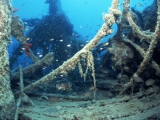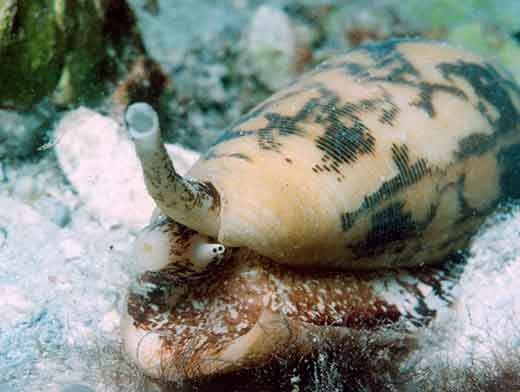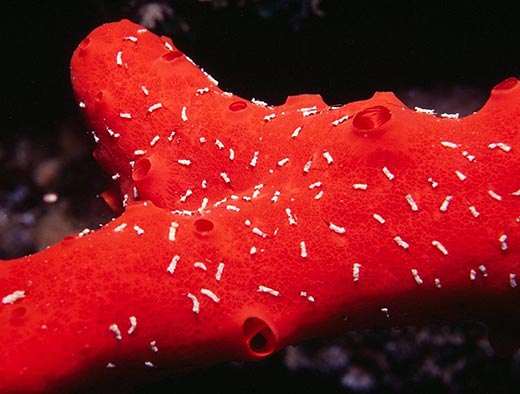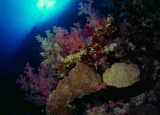~~~~~~~~~~~~~~~~~~~~~~~~~~~~
SCUBA News (ISSN 1476-8011)
Issue 177 - February 2015
http://www.scubatravel.co.uk
~~~~~~~~~~~~~~~~~~~~~~~~~~~ ~
Thank you very much for subscribing to SCUBA News. This month we're pleased to have a guest article by Sam Andrews on some of the medicines we get from the sea.
You can download a pdf version of this newsletter here.
I hope you enjoy SCUBA News but should you wish to cancel your subscription you can do so at http://www.scubatravel.co.uk/news.html. SCUBA News is published by SCUBA Travel Ltd.
Contents:
- What's new at SCUBA Travel?
- Letters
- View through a Wave wins Underwater Photo Contest
- Diving news from around the World





Diving in Tanzania
Tanzania's spice islands, Zanzibar and the Mafia Islands archipelagos, have some beautiful diving. More info and great photos now at
scubatravel.co.uk/africa/tanzania-diving-zanzibar.html

Diving in Mexico
The diving is extremely varied in Mexico, from the reefs of Cozumel to the teeming-with-life sites of Baja California and the extraordinary cavern diving of the Cenotes. More at
scubatravel.co.uk/americas/mexico-diving.html

Wreck Diving in Egypt
The Red Sea has some of the best diving in the world, more details now at
scubatravel.co.uk/redsea/wreckdive.html
Letters
Diving Tobago
In our last issue Ian Kingston asked if anyone could recommend a dive company in Tobago...
In response to Ian Kingston's message in Scuba News #176, if you want the really best diving, stay at Blue Waters Inn, Speyside and dive with Blue Waters Dive'n (5 star PADI). Hotel and diving is spectacular. I speak from first-hand experience.
Rob Jackson
Article by Sam Andrews
Humans are not infallible. We get sick, we get injured. Humans are a clever bunch though, and since prehistoric times we have used medicine to try and heal our ailments. Medical science has made huge leaps and bounds, providing treatments and vaccinations, surgical procedures, and physical and psychological therapies that have allowed people to survive - and thrive - injuries and illnesses which would have once been fatal. Medical science never stops evolving, learning and searching for more ways to keep us in tip-top condition. That search includes delving beneath the ocean waves. Here's just a couple of examples of how medical science has been furthered by studying ocean creatures:

Taking away the pain with...venom?!
The humble snail. Not the most exciting of creatures you would think. Cone snails (Conus) are a genus of marine snails…marine snails that hunt. Predating on worms, small fish and molluscs these slow-moving hunters are equipped with a toxic harpoon. One speared, their prey is paralyzed and slowly but surely the cone snail can make its way over and feast. It's not all pain though, as a paper by Dr Fedosoc from the Russian Academy of Sciences and colleagues points out. It seems that the toxins have another use too - the development of pain killers.

Just a word of warning if you do come across a cone snail. They will have a go at humans too. Most species will just sting you badly, but some can kill!
A bony issue
Breaking bones is never fun, especially when the break is very complex. Sometimes the breaks are so complex they simply cannot repair by themselves, so surgery is needed. Bone grafting has been used for a number of years to help the healing process. Essentially grafts act as scaffolds onto which bone can grow. It seems that fully converting the calcium carbonate that corals use to create their exoskeleton into coralline hydroxyapatite is pretty decent grafting material, if a little fragile. But there is a problem - the grafts don't fully biodegrade. Ideally we don't want to leave grafts in the body if we can help it. Doing so introduces the risk of infection, and even a risk of re-fracture. All is not lost though. Kun Fu from Hainan Medical College, China and colleagues from the UK have managed to make some improvements. By partially converting the calcium carbonate into coralline hydroxyapatite, they were able to retain some of the natural biodegradability of calcium carbonate in the graft material. Good stuff! Of course, we can't keep harvesting corals for grafts but it opens up the possibility to explore the role of calcium carbonate further.
Researching cancer treatment with sponges

Marine sponges are sort of like a living pharmacy. The more we study them the more we find "pharmacologically-active chemicals" which we could use to help further medical science. Researchers like Sabine Ottinger from the University of Heidelberg and German Cancer Research Centre and colleagues are exploring novel ways tackling some cancers. Focusing their efforts the extraction of anticancer and cytotoxic (toxic to cells) compounds found within sponges, the team note that some of these compounds - in particular those found in one species Crambe crambe – may be useful for tacking cancer stem cells. This is all very much research in development - no treatment has been found, but it seems that the sponges have given us another area that is very much worth exploring.
If you want to learn more about cancer and potential treatments, head on over to Buddhini Samarasinghe G+ page or her website where you can easily read her excellent "The Hallmarks of Cancer" series.
Guest article by Sam Andrews
Marine conservation, biology and ecology science communicator and writer.
Photos: Tim Nicholson, David Burdick.
If you would like to contribute an article to SCUBA News, please get in touch. Email news@scubatravel.co.uk. Your article must be original and can be about diving, sealife or the marine environment: a report on the diving in a specific area for example.
Our round up of the more interesting underwater news stories of the past month. For breaking news see our Twitter page or RSS feed

Rise in shark attacks does not mean more sharks
Australian beaches have been closed following a spate of shark sightings and fatal attacks. But shark numbers are not to blame.
White Sharks Grow More Slowly and Mature Much Later Than Previously Thought
With lifespan estimates of 70 years and more, white sharks may be among the longest-lived fishes. Sharks that mature late, have long life spans and produce small litters have the lowest population growth rates and the longest generation times. Increased age at maturity would make white sharks more sensitive to fishing pressure than previously thought, given the longer time needed to rebuild white shark populations.
Travelling Divers Could Be a Key to Healthier Caribbean Coral Reefs
Most scuba tourists surveyed expressed a stronger preference for seeing large fish over large numbers of fish on dives. Some parts of the Caribbean no longer have many of these larger fish, such as snappers and groupers, due to a history of overfishing that continues today. To safeguard tourism countries need to also safeguard their reefs.
Basking shark seen for first time in Indonesia
These giant fish migrate south from cold northern waters every winter. They are rarely seen as they swim deep and not much is known about where they go. One, at least, has been on his holidays to Bali, taking a short cut between the Pacific and the Indian Ocean.

Good news and bad news for coral reefs
There's good news related to marine protected areas, but bad news related to loss of coral cover
Scotland's First and only marine reserve benefits fisheries
The high level of breeding within the reserve is likely to be seeding the surrounding fishing grounds.
Scientists alarmed by rise in dolphin strandings on Irish shores
The number of common dolphins stranded throughout the country since October is close to the amount that should be expected for an entire year

How warm-bodied tuna hearts keep pumping in killer cold
Pacific bluefin tuna are unique amongst bony fish as they are warm bodied and are capable of elevating their core body temperature above that of the surrounding water. They are also capable of diving down below 1000 m into much colder water which would stop the hearts of other animals.
Twin moves on Arctic drilling stir environmental debate
As the White House announces that it wants to ban drilling for oil in parts of Alaska, Shell says it is reviving plans to drill in the Chukchi Sea
World's ocean species up to 9 times likelier to become extinct than previously thought
The alarming study by the University of Sheffield, has been said to be the most thorough analysis of marine conservation data yet
* Copyright SCUBA Travel - http://www.scubatravel.co.uk/
* Reprinting permitted with this footer included.
We are happy for you to copy and distribute this newsletter, and use parts of it on your own web site, providing the above copyright notice is included and a link back to our web site is in place.
Photo credits: Tim Nicholson; David Burdick
Previous editions of SCUBA News are archived at http://www.scubatravel.co.uk/news.html
SUBSCRIBING AND UNSUBSCRIBING
Visit Unsubscribe and add or remove your e-mail address. To change whether your receive the newsletter in text or HTML (with pictures) format visit this link
ADVERTISING
Should you wish to advertise in SCUBA News, please see the special offers at
http://www.scubatravel.co.uk/newsad.html
Other advertising opportunities are at
http://www.scubatravel.co.uk/advertising.html
CONTACTING THE EDITOR
Please send your letters or press releases to:
Jill Studholme
SCUBA News
The Cliff
Upper Mayfield
DE6 2HR
UK
news@scubatravel.co.uk
PUBLISHER
SCUBA Travel Ltd, 5 Loxford Court, Hulme, Manchester, M15 6AF, UK
No comments:
Post a Comment